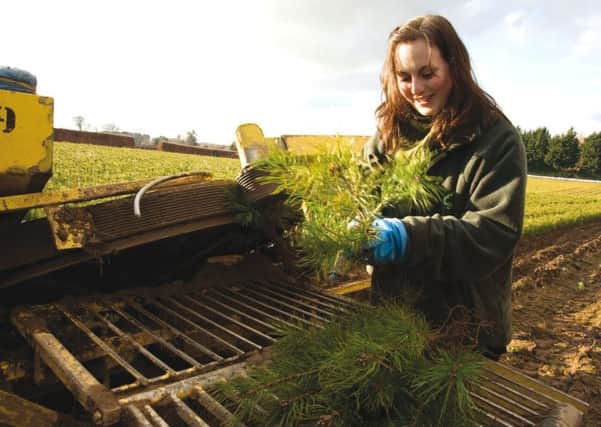Plant seeds to keep a £1bn industry growing


The Future of Forestry in Scotland consultation ends on 9 November, kickstarting the legislative process towards a new Forestry Bill.
And there is reason for optimism; in Fergus Ewing, we have a Cabinet Secretary who understands that meeting tree planting targets is a crucial part of a successful rural future for Scotland.
Advertisement
Hide AdAdvertisement
Hide AdHe has appointed a former Chief Planner to advise how the approval process for new tree planting can work better, encouraging high- quality schemes that benefit the economy and the environment.


At the recent summit with the forestry sector in Boat of Garden, Mr Ewing uttered a simple truth: “To generate further growth, we need more trees in the ground.”
The current planting target is 10,000 hectares of new woodland every year and Mr Ewing has made it his business to hit it.
The Committee on Climate Change, however, thinks more can be done longer term. Its recent report says the Scottish Government should consider increasing planting to 15,000 hectares annually (still smaller than Clackmannanshire, to put it into perspective) to help meet Scotland’s ambitious targets to cut greenhouse gas emissions and to create rural jobs and reduce future flood risks too.
I spoke at the summit, highlighting the enormous opportunities of planting and using more wood, a versatile, infinitely renewable and low-carbon material; planting trees soaks up carbon and making wood products stores carbon.


The opportunity to plant local forests to supply everyday wood products was spotlighted in Confor’s short film, Animating Forestry (www.youtube.com/watch?v=q_dhXbLj9mE).
Forestry is also a major opportunity for rural communities, including farmers, as we leave the Common Agricultural Policy of the EU. Planting trees on hill-sheep farms can increase income, plough more money into the local economy and help maintain sheep by providing winter shelter.
So how can the full devolution of forestry and changes to Forestry Commission Scotland help? How do we get it right, for our economy, environment and rural communities? Forestry has too long been “out in the cold”, a victim, perhaps, of its ability to provide such a wide range of benefits (economic growth, employment, carbon, biodiversity, recreation, health) that it lacks a single proposition allowing it to cut through policy thinking across government.
Advertisement
Hide AdAdvertisement
Hide AdThe report showing it is a £1bn industry has certainly helped, as have studies by Confor demonstrating how forestry supports rural economies, mitigates flooding and locks up carbon.


It is proposed in the consultation that forestry policy, support and regulation be embedded more clearly in the Scottish Government to allow a new forestry “division” to build better and stronger links and relationships across departments. This is to be welcomed, as long as we do not lose staff with professional forestry expertise who understand the complexities of modern forestry management.
Forestry as a professional discipline should be recognised explicitly in the remit for staffing the new division, for example by designating posts requiring a forestry or related qualification and designating the head of the division as Chief Forester for Scotland.
The National Forest Estate (NFE) is strategically vital; its productive forestry has helped to drive a modern, hi-tech, highly skilled industry. While the private forestry sector now provides a majority of the wood processed in Scotland, productive woodland managed by Forest Enterprise Scotland is significant, not least in supporting investment in wood processing. Confor will therefore seek a guarantee that future NFE wood supply will remain at least at current levels.
At the same time, it is clear the NFE, alongside well-managed privately owned forests, is bringing to people the story of modern forestry and the wide benefits it provides. Cheek-by-jowl, we see people, wildlife and the broader environment all benefiting from Scotland’s forests.


The Scottish Government proposals identify three priorities for continued UK-wide collaboration and co-operation which Confor has also identified as crucial: forestry science and research; protecting trees from pests and diseases; and common codes such as the UK Forestry Standard (the “bible” for modern forest management) and Woodland Carbon Code, which supports credible trading in carbon for tree planting.
This might all sound technical and a little mundane compared to the pleasure of walking or working in a Scottish forest.
However, we have to get this right. If we do, our £1bn industry will continue to grow and deliver even greater benefit for Scotland’s economy, environment and rural communities.
Stuart Goodall is Chief Executive of Confor: promoting forestry and wood.